From $50 Fines for Missed Notes to a Failed Nixon Endorsement — The Biggest Revelations from “James Brown: Say It Loud”
- Oops!Something went wrong.Please try again later.
- Oops!Something went wrong.Please try again later.
- Oops!Something went wrong.Please try again later.
'James Brown: Say It Loud' airs Monday and Tuesday at 8 p.m. ET/PT on A&E
James Brown, though a voice for his generation, had a complicated life and career.
In James Brown: Say It Loud, a four-part docuseries directed by Deborah Riley Draper, viewers get an inside look at the Godfather of Soul's legendary rise to fame.
Brown, who died on Dec. 25, 2006 at age 73, became an international sensation with hits like "I Got You (Feel Good)," "Get Up Offa That Thing," and "Living in America." He also started political movements with songs like "Say It Loud — I'm Black and I'm Proud."
Though his career proved to be a lengthy highlight reel, the singer was also met with turmoil. From the backlash he faced after a President Richard Nixon endorsement to his role in healing the country after the assassination of Martin Luther King Jr., here are the biggest revelations from James Brown: Say It Loud, airing Monday and Tuesday at 8 p.m. ET/PT on A&E.
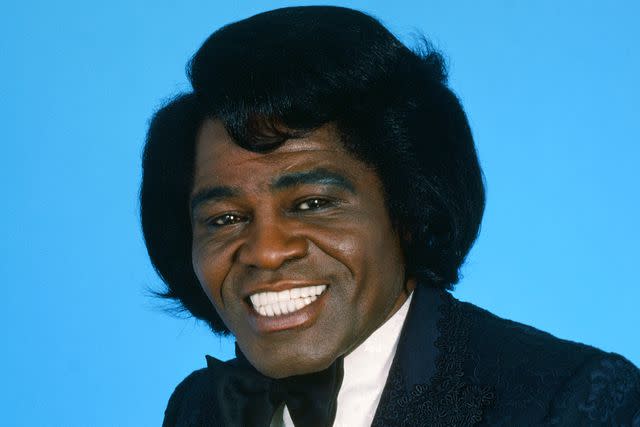
Frank Carroll/NBCU Photo Bank/NBCUniversal via Getty
James BrownHe made his bass player pay $50 for missing a note during a performance
If James was one thing, it was a man who strove for perfection.
"He believed in perfection — and that the audience should get what they paid for. He was willing to do whatever it took to make sure perfection was there," Larry Brown, his son, says in the documentary. "He demanded it — and he got it."
Before he got onstage for a performance, everything needed to be right. Otherwise, his crew would get fined.
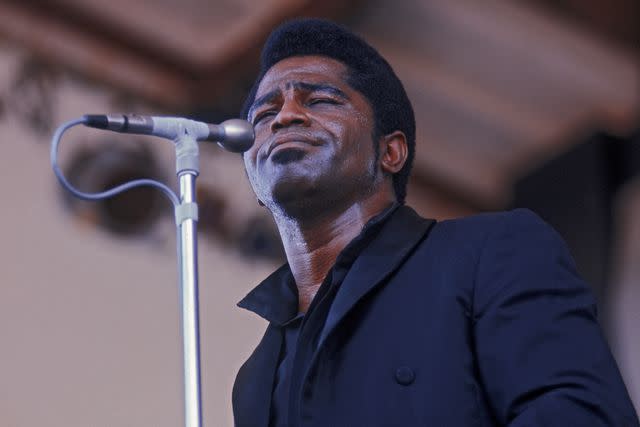
Hulton Archive/Getty
James Brown performs in 1968"I got fined $50 one time, for one note," Fred Thomas, his bass player, says. "He's playing 'If I Ruled the World' and I almost missed a note — I just kind of slid into it. It wasn't a train wreck but it was a little rough."
He recalls what James told him after the performance: "He said, 'You know what you did.'"
He could hear every voice, every note, and he knew who would make a mistake. He also cared about wardrobe and uniform — and his team needed to follow suit.
He was an integral part of the original Black Lives Matter
After the assassination of Martin Luther King Jr. in 1968, he brought communities in Boston together with the release of his hit single "Say It Loud — I'm Black and I'm Proud."
The day after King was killed, there were riots across the country fueled with anger and frustration. James, however, was set to perform at the Boston Garden that night and there was hesitation around his getting onstage amid the state of the country. Ultimately, it was decided the show should go on — and it should be televised.
During the show, fans were jumping onstage and James asked the police to step back and let them be.
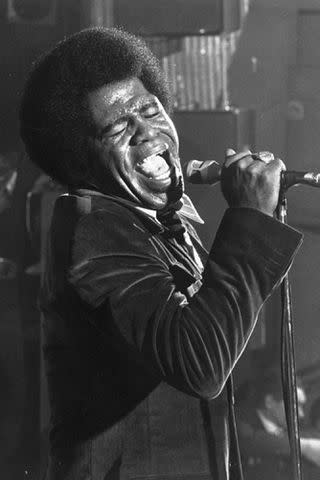
Michael Ochs Archives/Getty
James Brown performs in 1968"That was a big deal. It saved Boston. There was no fighting and looting like it was going on in other major cities," his daughter, Dr. Deanna Brown Thomas, 55, says. "In Boston, everyone was in a groove."
Later that year, he was pressured by radical groups to stand with the Black community. He decided to write a song that took the stigma out of being called "Black" by releasing "Say It Loud — I'm Black and I'm Proud."
This created a new way of thinking.
His support for President Richard Nixon was met with resistance
In 1969, James performed at Richard Nixon's inauguration. Then, in 1972, he endorsed him for a second term — though this proved to be detrimental to his music career.
"I believe in the future of the country lies with Mr. Nixon. Some of the things that he's done has been very close to my heart as a minority, as a Black man, [like] having the private Black colleges so that we can maintain our culture and get an education. He's the man for the job," James said in an interview at the time, explaining his reasoning for his support.
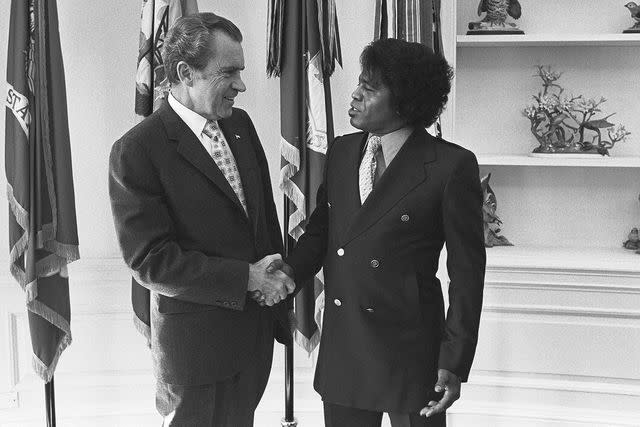
Oliver F Adkins/PhotoQuest/Getty
President Richard Nixon and James Brown in October 1972Eventually, this decision proved to be equivalent to "selling his community out," despite his intentions to push "the Black agenda." It ended up costing him record sales and there were pickets outside his apartment.
"When the going got rough — a lot of people backed up and walked away from me," James said in an interview clip.
James had a history of domestic abuse — and his daughter stood up to him because of it
Early on in the documentary, it's made known that the singer-songwriter had a difficult upbringing. He grew up in the Jim Crow-era South with a father who would beat him and his mother.
"When you see that and you think that’s what love looks like, or that’s the only love that you know, then that’s how you’re going to express it," Dr. Yamma Brown, 51, his youngest daughter, says in the documentary.
Yamma goes on to explain that she experienced the same thing growing up — and one day she decided she had enough.
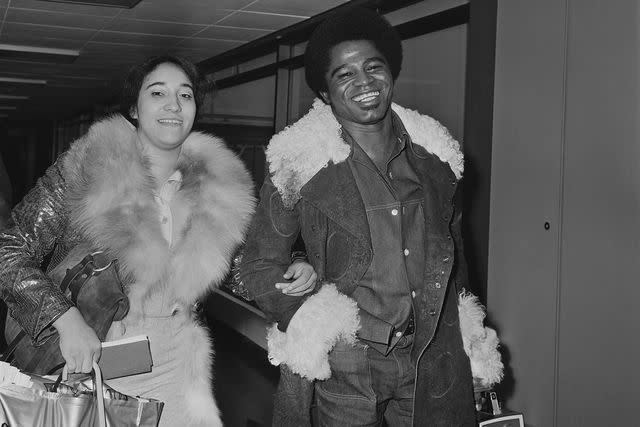
George Stroud/Daily Express/Getty
Deidre Jenkins and James Brown“I remember being 5 or 6 and thinking, ‘I just can’t take it anymore.' And you hear about this, where people’s kids stand up to their parent’s abuser before the parent will," she says of her mother Deidre Jenkins, James' second wife.
"What I remember as clear as day... my mom had on a blue and white robe and he literally was screaming and hollering and hitting her and she was crying. I just remember going over there and trying to pull him off of her," she continues. "And the look that he gave me was like, ‘Who is this person?’ But it didn’t even matter to me because in that moment I was just trying to protect my mother."
That was the last time she ever saw her father hit her mother — and she found forgiveness for him overtime.
Related: James Brown's Daughters Explain Why They Forgave Him After Seeing Him Beat Their Mom (Exclusive)
His 1988 prison sentence was a lifeline
In 1988, James was involved in a two-state car chase through Georgia and South Carolina after he pulled out a shotgun in a public setting.
During the car chase, 17 bullets were fired at his truck by police and he was eventually pulled over and arrested: "Had only one bullet hit the gas tank — the truck would've blew up," says Deanna.
After going to trial, he was found guilty of failing to stop for a police officer and two counts of aggravated assault. He was sentenced to six years and six months in prison.
He served two-and-a-half years — and his time there proved to be transformative.
"This was my two-year unwanted vacation," Yamma recalls her father saying. "He needed to rest, he needed to detox."
It wasn't long after his release that he got back to work — and proved he was still James Brown.
James Brown: Say It Loud is airing on A&E on Monday, Feb. 19, and Tuesday, Feb. 20 at 8 p.m. EST.
For more People news, make sure to sign up for our newsletter!
Read the original article on People.

